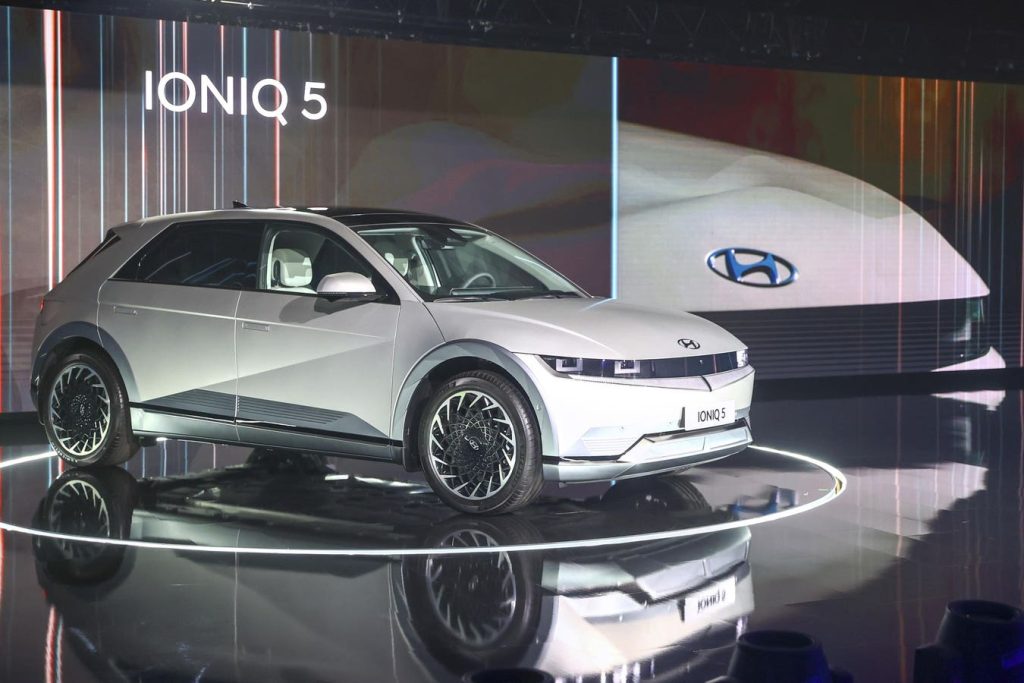Already transitioning to BEVs to overtake established rivals in mass production, South Korean group Hyundai Motor today pledged another $18. 2 billion (24 trillion South Korean won) through the end of the decade to boost its electric vehicle production.
With its eyes on a top-three place in BEV production by 2030, the Hyundai Group (which controls the Hyundai, Kia and Genesis brands) announced a target of 1.51 million EVs a year for its Korean-built BEVs by the end of the decade.
That figure averages to $2.6 billion a year on top of the $23.6 billion it has already-committed R&D funding for new vehicles, taking it to a total of $41.8 billion in BEV commitments.
By comparison, Tesla claims to have committed $100 billion on EV and plant R&D development by 2030, though that should be treated with skepticism. Its total R&D spend bumbled along at less than $1.5 billion a year until 2020, and only grew to $3.1 billion last year.
The entire auto industry spent $124 billion on R&D last year, according to Statistica, and $116 billion in 2021, but has committed to spending $1. 2 trillion on R&D for electric cars through 2030.
Among R’s commitments
The is that the entire budget of R
U. S. automakers Ford ($43 billion) and General Motors ($27. 5 billion) are deeply committed to the BEV schedule through 2030, while other major players include the world’s largest combustion engine maker, Honda ($37. 8 billion), BMW ($26. 5 billion) and China. SAIC (24 billion dollars).
BYD’s announced commitments of just $10 billion are oddly small, as are Mercedes-Benz ($17 billion), Nissan ($12. 6 billion) and Renault ($9. 4 billion).
Stellantis has only dedicated $11.5 billion to EV R&D to spread across the Fiat, Peugeot, DS, Citroen, Opel, Maserati, Alfa Romeo, Lancia, Jeep, RAM, Dodge and Chrysler brands.
Hyundai showed that it will have 31 new BEV models across its 3 brands and plans to open a new production plant in Hwaseong, south of Seoul.
There will be 17 BEVs between Hyundai and Genesis until 2030 and 14 more at Kia. The first of the new BEV models will be Kia’s EV9 crossover, followed next year by Hyundai’s Ioniq 7.
Hyundai has already used its BEVs to boost both its sales and image, with back-to-back World Car of the Year awards (with the Ioniq 6 this year and the Ioniq 5 last year).
It won other awards this year, adding the World Design Award and the World Electric Vehicle Award for the Ioniq 6, while the similar Kia EV6 GT won the World Performance Car Award.
But the 2030 sales target would absorb a third of all projected BEV production through the end of the decade, and the Group is supporting this target through investment to modernize South Korea’s “electric vehicle ecosystem. “
“We aim to upgrade Korea’s EV ecosystem and strengthen its role as a hub for driving innovation in the global automotive industry,” the statement said.
“It is also expected to promote a virtuous cycle of domestic EV production, R&D, infrastructure and related industries.”
The Group has a plant in North America and has lobbied the U. S. government for the U. S. government. To adjust the Inflation Reduction Act, so that it wants to build BEVs in the U. S. A new way to qualify for zero-emission subsidies is available to consumers in the U. S.
One Community. Many Voices. Create a free account to share your thoughts.
Our network aims to connect other people through open and thoughtful conversations. We need our readers to share their perspectives and exchange ideas and facts in one space.
To do this, please comply with the posting regulations in our site’s terms of use. Below we summarize some of those key regulations. In short, civilized.
Your post will be rejected if we notice that it seems to contain:
User accounts will be blocked if we become aware that users are engaged in:
So, how can you be a user?
Thank you for reading our Community Guidelines. Read the full list of publishing regulations discovered in our site’s terms of use.

